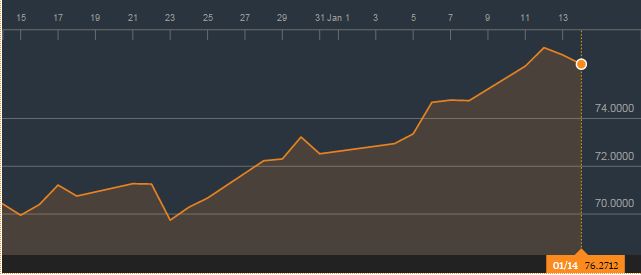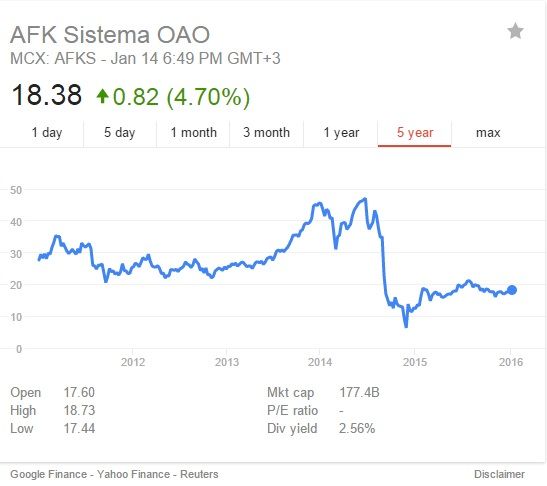The criminal case against Vladimir Yevtushenkov, chairman of the board of AFK Sistema, regarding his acquisition of the Bashneft oil company and other fuel companies of Bashkortostan has been dropped
Welcome to our column, Russia Update, where we will be closely following day-to-day developments in Russia, including the Russian government’s foreign and domestic policies.
The previous issue is here.
Recent Translations:
–The Non-Hybrid War
–Kashin Explains His ‘Letter to Leaders’ on ‘Fontanka Office’
–TV Rain Interviews Volunteer Fighter Back from Donbass
–‘I Was on Active Duty’: Interview with Captured GRU Officer Aleksandrov
UPDATES BELOW
Gubashev, who served in the Chechen Interior Ministry troops’ Sever [North] Battalion along with Saur Dadayev and Ruslan Geremeyev, claims that on the day of the murder, he drove around with Shavanov who then asked to be taken to a restaurant Nemtsov frequented which is on Red Square.
Dadayev, who was handed the final charges on December 29, 2015, remains in custody and Geremeyev fled the country. Three others — Shadid Gubashev, Termirlan Eskherkhan and Khamzat Bakhayev were also charged.
The investigation has been extended until February 28, 2016.
— Catherine A. Fitzpatrick
The leader of track’s governing body told a lawyer he’d need to cut a deal with Russian President Vladimir Putin to ensure nine Russian athletes accused of doping wouldn’t compete at the 2013 world championships in Moscow, according to a new World Anti-Doping Agency report on the scandal that reached the top of the sport and country.
The report, written by former WADA president Dick Pound and released Thursday in Munich, also states that Lamine Diack, the former president of the International Association of Athletics Federations (IAAF), was responsible for organizing and enabling the conspiracy and corruption that took place in athletics’ governing body.
IAAF leaders must have been aware of the full scale of doping in Russia but did nothing to stop it, and the track and field organization itself was riddled by corruption, a report by a World Anti-Doping Agency panel said Thursday.
“It is increasingly clear that far more IAAF staff knew about the problems than has currently been acknowledged,” said the report, written by former WADA president Dick Pound and presented at a news conference in Munich.
“It is not credible that elected officials were unaware of the situation affecting … athletics in Russia. If, therefore, the circle of knowledge was so extensive why was nothing done? Quite obviously there was no appetite on the part of the IAAF to challenge Russia.”
The report added: “The corruption was embedded in the organization. It cannot be ignored or dismissed as attributable to the odd renegade acting on its own.
The world has gone mad. Sports is so politicized, they’ve claimed even that even the president sponsors it…Surely you understand that this is already looking absurd, do you understand? It’s absurd. The scenarios are the same, someone will surface…in the [London] Times or in an American newspaper in advance in their sources.
Yet AP has reported that Mutko “backs the recommendations of the WADA report (see update at 6:20 pm).
“I looked at Pound’s report, now our officials are translating the WADA Special Commission report. We have nothing in particular to comment on, we have not heard anything new.”
“What I do agree with is that international federations should be responsible in their actions. It is not important whether we’re talking about the IAAF or some other organizations. If corruption is covered up on a systematic basis, what does a specific country have to do with it? The names and nationality of the participants of the process in this case have no meaning — whether they are from Russia or Senegal. What’s important is that the system works in this way, and people are forced to adjust to it.
If corruption is discovered in the IAAF, why should Russia be removed? We have done our work, whether someone likes this or not. I said and will continue to say: in our country a system of combating doping has been created. And it is one of the best in the world. There is no system of covering up even remotely. On the contrary, if it existed, then all these doping sandals would not leak out. We have conducted and will conduct this work further. It’s just that now the rights of the All Russian Federation of Light Athletics (AFLA) and our anti-doping services are suspended…
In the near future we will resume work, the disciplinary commission of the AFLA will begin operation, and the laboratory. On January 16, there will be elections for a new president of the federation. The work on the whole is under way, we have not ceased it.
“Light athletics” is the term used for track and field in Russia.
The ruble is having its second day of gains after reaching historic lows on Tuesday. Bloomberg has the ruble trading at 76.28 to a dollar, a marked improvement from Tuesday when that number was 77. The ruble is currently trading at 82.81 to a euro, an improvement over Tuesday’s 83.57.
The ruble’s performance over the last month against the dollar:
But oil and the ruble do not completely correspond. In fact, the rally in oil prices over the last two days has been larger than the ruble’s gains. Bloomberg reports:
The Russian currency advanced 0.4 percent to 76.392 per dollar by 6:45 p.m. in Moscow, set for the first two-day rally in more than a month. Brent crude rose 1.8 percent in London trading to $30.86 per barrel, bringing the 30-day correlation between two assets to 0.78, compared with 0.69 at the end of last year. A reading of 1 would indicate the two are trading in lockstep.
As we reported yesterday, Russian Finance Minister Anton Siluanov is warning that Russia needs to cut spending and increase revenue in order to prevent the deficit from exceeding 3 percent of the GDP, a scenario which could see Russia drain its foreign reserves.
Bloomberg reports:
Measures totaling 1.5 trillion rubles ($20 billion), including a 10 percent cut in spending that spares outlays on the military and social services, are needed to avoid a shortfall of more than 6 percent of gross domestic product this year, Siluanov said in a Bloomberg Television interview in Moscow on Wednesday. Unlike last year, there’s no need to support the ruble with foreign-currency sales by the Treasury, he said.
…
“If we consider today’s oil price and the ruble exchange rate and don’t take any measures, the deficit could more than double compared with the budget we have passed,” Siluanov said. “We have enough reserves, resources for 2016, but we need to make decisions this year that would allow to balance state finances in 2017, 2018, 2019 and beyond.”
The government wants to keep the deficit at no more than 3 percent of gross domestic product this year, after a shortfall of 2.6 percent in 2015. The Reserve Fund had $59 billion at end- November in dollar terms, down a third from a year earlier.
“Russia is still puzzled over how to deal with falling oil revenues to avoid a second year of recession,” Vladimir Miklashevsky, a strategist at Danske Bank in Helsinki, said by email. “If a sustainable realistic plan is agreed, the ruble may halt its devaluation. Yet, there’s plenty of room for the ruble’s further convergence with low oil prices.”
Russian energy giant Gazprom is also facing severe losses. According to RBC the company may have suffered losses up to $630 million in quarter 3 of 2015, losses that are likely to continue into 2016 and potentially beyond.
— James Miller
The Investigative Committee issued Yevtushenko a statement to this effect, his lawyer Vladimir Kozin told RBC.ru.
Shares of Sistema, which is 62% owned by Yevtushenko, shot up 6.7% to 18.73 rubles on the Moscow stock market.
(The good news hasn’t impacted the ruble rate, which is at 76.33, hovering around record lows; on September 30, 2014 it was 39.50.)
Thus, the saga is over that had shaken the Russian business community on September 17, September 2014 with the charging of Yevtushenko of fraud; his placement under house arrest and then release with the case pending; and the seizure of Bashneft by the state.
Yevtushekno was unexpectedly accused of involvement in money-laundering schemes involving Bashneft’s acquisition in 2009 — 5 years after the move took place — in a case that was widely seen as politically motivated.
Translation: On the whole, Yevtushenko was always loyal. So what is this now, there are no guarantees at all if Sechin has his eye on a business?
Translation: the house arrest of Yevtushenkov is like the story of Serdyukov. Yevtushenko is not just an oligarch but a “man with connections.” It’s a question of loss of trust.
(Serdyukov was the former defense minister who was arrested and then released.)
As we noted at the time, it wasn’t just the fall in global oil prices and the bite of Western sanctions over the annexation of the Crimea that caused the ruble’s fall, it was Yevtushenko’s arrest triggering a loss of confidence and shaking the unofficial bargain between Putin and the oligarchs — that if they do not engage in politics and remain loyal to him, their assets will remain intact.
— Catherine A. Fitzpatrick

